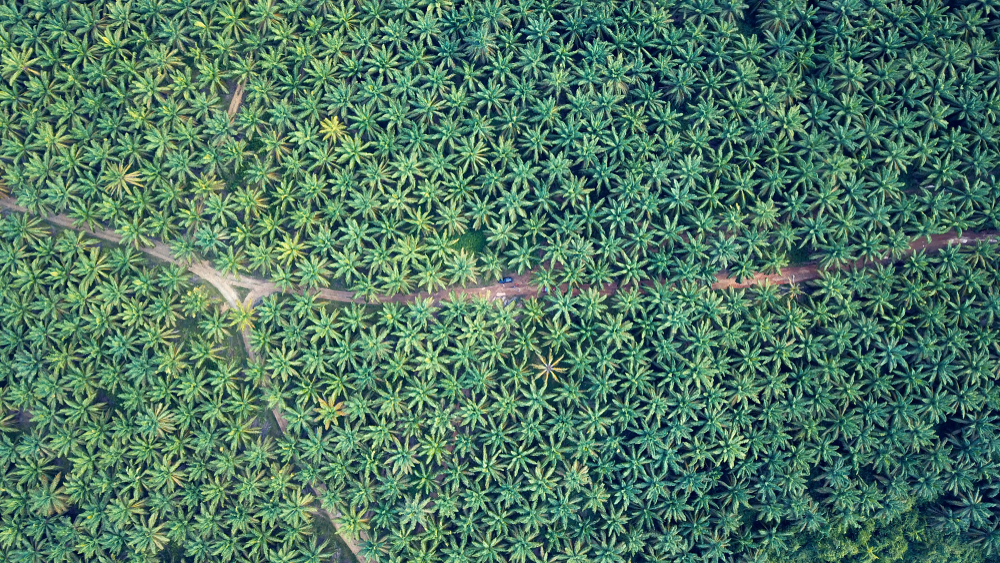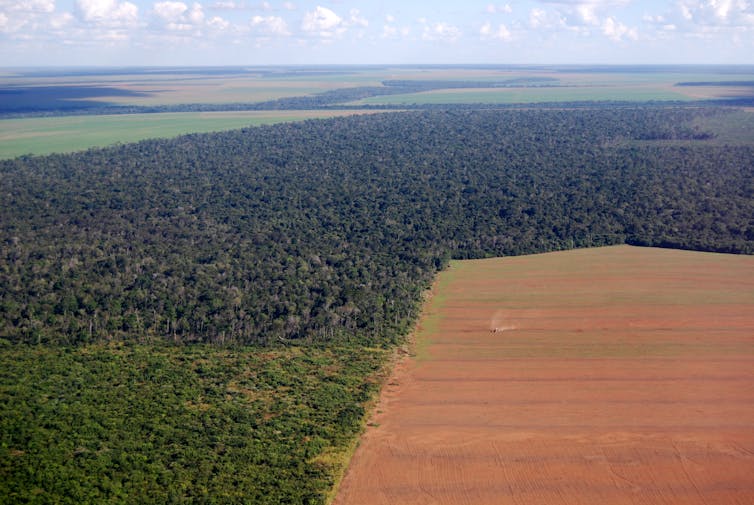How Our Food Choices Cut into Forests and Put Us Closer to Viruses
The erosion of forests due to industrial agriculture has increased our exposure to infectious diseases.
How Our Food Choices Cut into Forests and Put Us Closer to Viruses
The erosion of forests due to industrial agriculture has increased our exposure to infectious diseases.

A palm oil plantation in Indonesia. by Ishwar Thakkar on Shutterstock
This article is republished from The Conversation under a Creative Commons license. Read the original article.
As the global population has doubled to 7.8 billion in about 50 years, industrial agriculture has increased the output from fields and farms to feed humanity. One of the negative outcomes of this transformation has been the extreme simplification of ecological systems, with complex multi-functional landscapes converted to vast swaths of monocultures.
From cattle farming to oil palm plantations, industrial agriculture remains the greatest driver of deforestation, particularly in the tropics. And as agricultural activities expand and intensify, ecosystems lose plants, wildlife and other biodiversity.
The permanent transformation of forested landscapes for commodity crops currently drives more than a quarter of all global deforestation. This includes soy, palm oil, beef cattle, coffee, cocoa, sugar and other key ingredients of our increasingly simplified and highly processed diets.
The erosion of the forest frontier has also increased our exposure to infectious diseases, such as Ebola, malaria and other zoonotic diseases. Spillover incidents would be far less prevalent without human encroachment into the forest.
We need to examine our global food system: Is it doing its job, or is it contributing to forest destruction and biodiversity loss — and putting human life at risk?
What are we eating?
The food most associated with biodiversity loss also tends to also be connected to unhealthy diets across the globe. Fifty years after the Green Revolution — the transition to intensive, high yielding food production reliant on a limited number of crop and livestock species — nearly 800 million people still go to bed hungry; one in three is malnourished; and up to two billion people suffer some sort of micronutrient deficiency and associated health impacts, such as stunting or wasting.

The environmental impacts of our agricultural systems are also severe. The agricultural sector is responsible for up to 30 per cent of greenhouse gas emissions, soil erosion, excessive water use, the loss of important pollinators and chemical pollution, among other impacts. It is pushing planetary boundaries even further.
In short, modern agriculture is failing to sustain the people and the ecological resources on which they rely. The incidence of infectious diseases correlates with the current loss of biodiversity.
Deforestation and disease
Few viruses have generated more global response than the SARS-CoV-2 virus responsible for the current pandemic. Yet in the past 20 years, humanity has also faced SARS, MERS, H1N1, Chikungunya, Zika and numerous local outbreaks of Ebola. All of them are zoonotic diseases and at least one, Ebola, has been linked to deforestation.
Farming large numbers of genetically similar livestock along the forest frontier may provide a route for pathogens to mutate and become transmissible to humans. Forest loss and landscape change bring humans and wildlife into ever-increasing proximity, heightening the risk of an infectious disease spillover.
An estimated 70 per cent of the global forest estate is now within just one kilometre of a forest edge — a statistic that starkly illustrates the problem. We are destroying that critical buffer that forests provide.
Zoonoses may be more prevalent in simplified systems with lower levels of biodiversity. In contrast, more diverse communities lower the risk of spillover into human populations. This form of natural control is known as the “dilution effect” and illustrates why biodiversity is an important regulatory mechanism.
The pandemic is further heightening pressures on forests. Increased unemployment, poverty and food insecurity in urban areas is forcing internal migration, as people return to their rural homes, particularly in the tropics. This trend will no doubt increase demands on remaining forest resources for fuel wood, timber and further conversion for small-scale agriculture.
Wet markets under scrutiny
The links between zoonoses and wildlife has led to many calls during the current pandemic to ban the harvest and sale of wild meat and other forms of animal source foods. That might be too hasty a reaction: wild meat is an essential resource for millions of rural people, particularly in the absence of alternative animal food sources.
It is, however, not necessarily essential for urban dwellers who do have alternative sources of animal protein to purchase wild meat as a “luxury” item. Urban markets selling wild meat could increase the risk of zoonotic spillover but not all wet markets are the same. There are countless wet markets throughout the world that do not sell wildlife products and such markets are fundamental to the food security and nutrition as well as the livelihoods of hundreds of millions of people.
Even before the COVID-19 pandemic took hold, international agencies, including the Committee on World Food Security, have been concerned about the long-term viability of our current food system: could it provide diverse and nutritious diets while maintaining environmental sustainability and landscape diversity? The current pandemic has highlighted major shortfalls in our environmental stewardship.
We must harness the interconnected nature of our forests and food systems more effectively if we are to avoid future crises. Better integration of forests, agroforests (the incorporation of trees into agricultural systems) at the broader landscape scale, breaking down the institutional, economic, political and spatial separation of forestry and agriculture, can provide the key to a more sustainable, food secure and healthier future.
Terry Sunderland is a professor in the Faculty of Forestry at the University of British Columbia.
Follow us

This work is licensed under a Creative Commons Attribution-NoDerivatives 4.0 International License.
Want to republish a Modern Farmer story?
We are happy for Modern Farmer stories to be shared, and encourage you to republish our articles for your audience. When doing so, we ask that you follow these guidelines:
Please credit us and our writers
For the author byline, please use “Author Name, Modern Farmer.” At the top of our stories, if on the web, please include this text and link: “This story was originally published by Modern Farmer.”
Please make sure to include a link back to either our home page or the article URL.
At the bottom of the story, please include the following text:
“Modern Farmer is a nonprofit initiative dedicated to raising awareness and catalyzing action at the intersection of food, agriculture, and society. Read more at <link>Modern Farmer</link>.”
Use our widget
We’d like to be able to track our stories, so we ask that if you republish our content, you do so using our widget (located on the left hand side of the article). The HTML code has a built-in tracker that tells us the data and domain where the story was published, as well as view counts.
Check the image requirements
It’s your responsibility to confirm you're licensed to republish images in our articles. Some images, such as those from commercial providers, don't allow their images to be republished without permission or payment. Copyright terms are generally listed in the image caption and attribution. You are welcome to omit our images or substitute with your own. Charts and interactive graphics follow the same rules.
Don’t change too much. Or, ask us first.
Articles must be republished in their entirety. It’s okay to change references to time (“today” to “yesterday”) or location (“Iowa City, IA” to “here”). But please keep everything else the same.
If you feel strongly that a more material edit needs to be made, get in touch with us at [email protected]. We’re happy to discuss it with the original author, but we must have prior approval for changes before publication.
Special cases
Extracts. You may run the first few lines or paragraphs of the article and then say: “Read the full article at Modern Farmer” with a link back to the original article.
Quotes. You may quote authors provided you include a link back to the article URL.
Translations. These require writer approval. To inquire about translation of a Modern Farmer article, contact us at [email protected]
Signed consent / copyright release forms. These are not required, provided you are following these guidelines.
Print. Articles can be republished in print under these same rules, with the exception that you do not need to include the links.
Tag us
When sharing the story on social media, please tag us using the following: - Twitter (@ModFarm) - Facebook (@ModernFarmerMedia) - Instagram (@modfarm)
Use our content respectfully
Modern Farmer is a nonprofit and as such we share our content for free and in good faith in order to reach new audiences. Respectfully,
No selling ads against our stories. It’s okay to put our stories on pages with ads.
Don’t republish our material wholesale, or automatically; you need to select stories to be republished individually.
You have no rights to sell, license, syndicate, or otherwise represent yourself as the authorized owner of our material to any third parties. This means that you cannot actively publish or submit our work for syndication to third party platforms or apps like Apple News or Google News. We understand that publishers cannot fully control when certain third parties automatically summarize or crawl content from publishers’ own sites.
Keep in touch
We want to hear from you if you love Modern Farmer content, have a collaboration idea, or anything else to share. As a nonprofit outlet, we work in service of our community and are always open to comments, feedback, and ideas. Contact us at [email protected].by Terry Sunderland, Modern Farmer
December 30, 2020
Modern Farmer Weekly
Solutions Hub
Innovations, ideas and inspiration. Actionable solutions for a resilient food system.
ExploreExplore other topics
Share With Us
We want to hear from Modern Farmer readers who have thoughtful commentary, actionable solutions, or helpful ideas to share.
SubmitNecessary cookies are absolutely essential for the website to function properly. This category only includes cookies that ensures basic functionalities and security features of the website. These cookies do not store any personal information.
Any cookies that may not be particularly necessary for the website to function and are used specifically to collect user personal data via analytics, ads, other embedded contents are termed as non-necessary cookies.